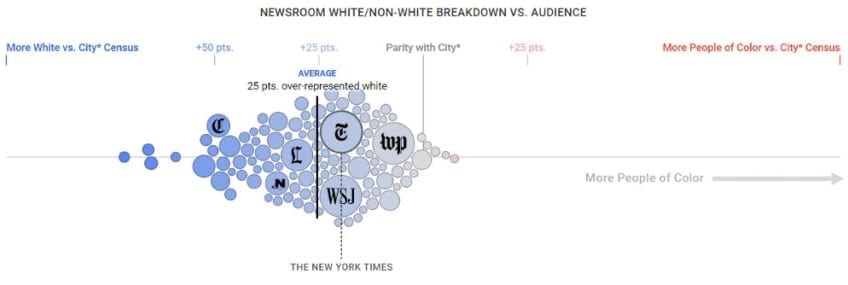|
Getting your Trinity Audio player ready...
|
While America and its citizens are more diverse than ever before, the newsrooms representing them are still overwhelmingly white. In today’s political climate, the need to amplify a wide range of perspectives is of critical importance. We at the Maynard Institute for Journalism Education, along with Google News Lab, the News Integrity Initiative, and Craig Newmark Philanthropies believe diversity in the newsroom is the future of digital media.
To support this ideal, we’ve launched the Maynard 200, a fellowship program that will train 200 diverse journalists in the next five years, focusing on three tracks: entrepreneurship, leadership, and storytelling. We will recruit participants to fill spots in each track. They will receive training as a whole cohort and get specialized training for their respective area of focus.

Professional Development
According to the 2017 American Society of News Editors Diversity Survey, the average newsroom workforce at all 661 legacy and digital sites polled was about 16.6 percent minority. For many of the journalists of color working at these outlets, the structures that were in place to support their professional development have been wiped out. Without professional development, this already too-small group is less likely to continue in their journalistic careers.
The Maynard 200 will combat this issue head on, by bringing journalists from varied but complementary backgrounds together to learn and build their networks. We envision Maynard 200 as the beginning of a movement of people of color who will articulate the value of diversity across media.
Digital Dilemma
In the digital space, the situation is even more acute. Clear pathways to and through many new online outlets have never existed or are under resourced. Many of these outlets also suffer perception bias, which is the belief that simply because the outlet is staffed with younger more progressive thinkers, there isn’t a need to be intentional about addressing diversity.
We recognize that many of tomorrow’s journalism entrepreneurs and leaders of color now operate on their own, or as independent contractors, tasked with their own professional development and left to fend for themselves in finding mentors, supportive peers and access to capital. We also know that storytellers of all types seek to contribute to the narrative of their communities. These non-traditional voices don’t hail from top journalism programs. They may work for small independent outlets with little access to training or mentorship.
The Challenges
Impact Architects LLC, together with Maynard Institute for Journalism Education, developed a survey from November 2017 through February 2018 to be administered among journalists. The survey’s main goal was to identify challenges, needs, and desires of journalists to help inform the design and implementation of the Maynard 200 education initiative.
One of the most outstanding findings from this survey was the lack of mentorship and support for journalists. Of the 509 journalists surveyed, less than one quarter (23%) of respondents said they are currently receiving coaching or assistance from a mentor. Additionally, respondents were relatively evenly split as to whether their employer provides training opportunities, with half saying “no” (49%) and half saying “yes” (40%) or “unsure” (11%). More than half said that their employers don’t offer paid leave for participation in training, conferences, and/or workshops.
Diverse Needs
The Maynard Institute is uniquely positioned to serve these professionals and create a movement across the media. By offering training, networking, and professional support for young journalists of color, the Maynard 200 seeks to remind the media of the paramount importance of diversity, and expand their impact not only in the next five years, but for generations to come.
Yes, we see this program as a means to re-establish Maynard as a leader in the eyes of a new generation of media professionals. But it’s much bigger than us.
It’s about creating a movement, a rallying cry for journalists of color at a time when the integrity of journalists and journalism are under constant attack. It’s time for us to take action and support a more diverse media workforce so that the media can better reflect consumers and serve its vital role to inform the public.
About the authors
Evelyn Hsu is co-executive director of the Robert C. Maynard Institute for Journalism Education. Prior to joining the Maynard Institute, she was a member of the faculty of the Poynter Institute, and before that, she was an associate director of the American Press Institute. She has worked as a reporter for The Washington Post and for the San Francisco Chronicle. She is a past national president of the Asian American Journalists Association.
Martin G. Reynolds is Co-Executive Director of the Maynard Institute for Journalism Education overseeing external affairs and fundraising. He also directs the Reveal Investigative Fellowships. Reynolds is the former editor-in-chief of The Oakland Tribune (CA), and was a lead editor on the Chauncey Bailey Project, formed to investigate the slaying of the former Oakland Post editor. Reynolds is a lead trainer for the Maynard Institute, focusing on cultural competency and community engagement. His journalism career spans two decades, and includes the co-founding of Oakland Voices, a community storytelling program that empowers residents to contribute to the narrative of their lives.
Republished with kind permission of Digital Content Next, advancing the future of trusted content


